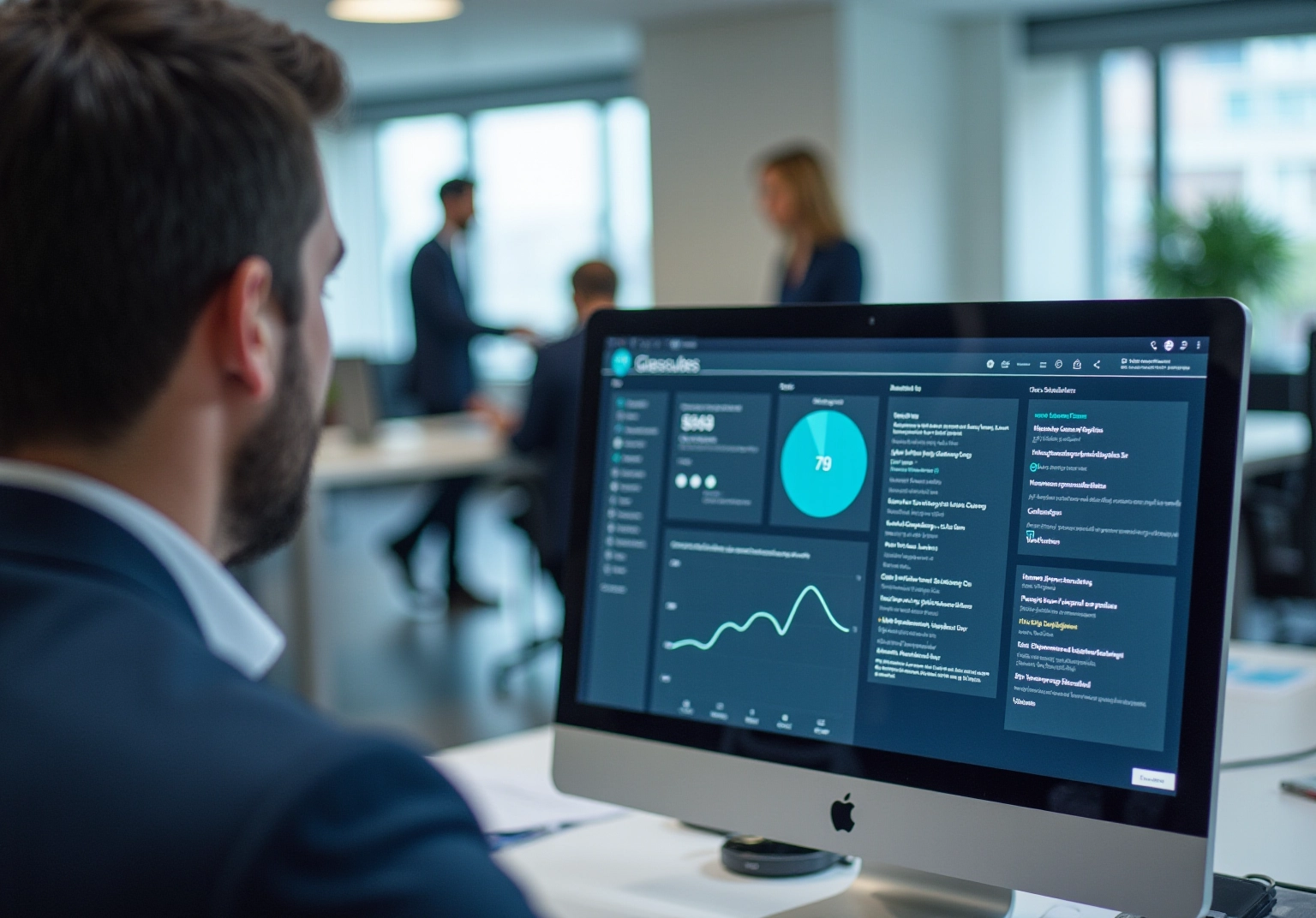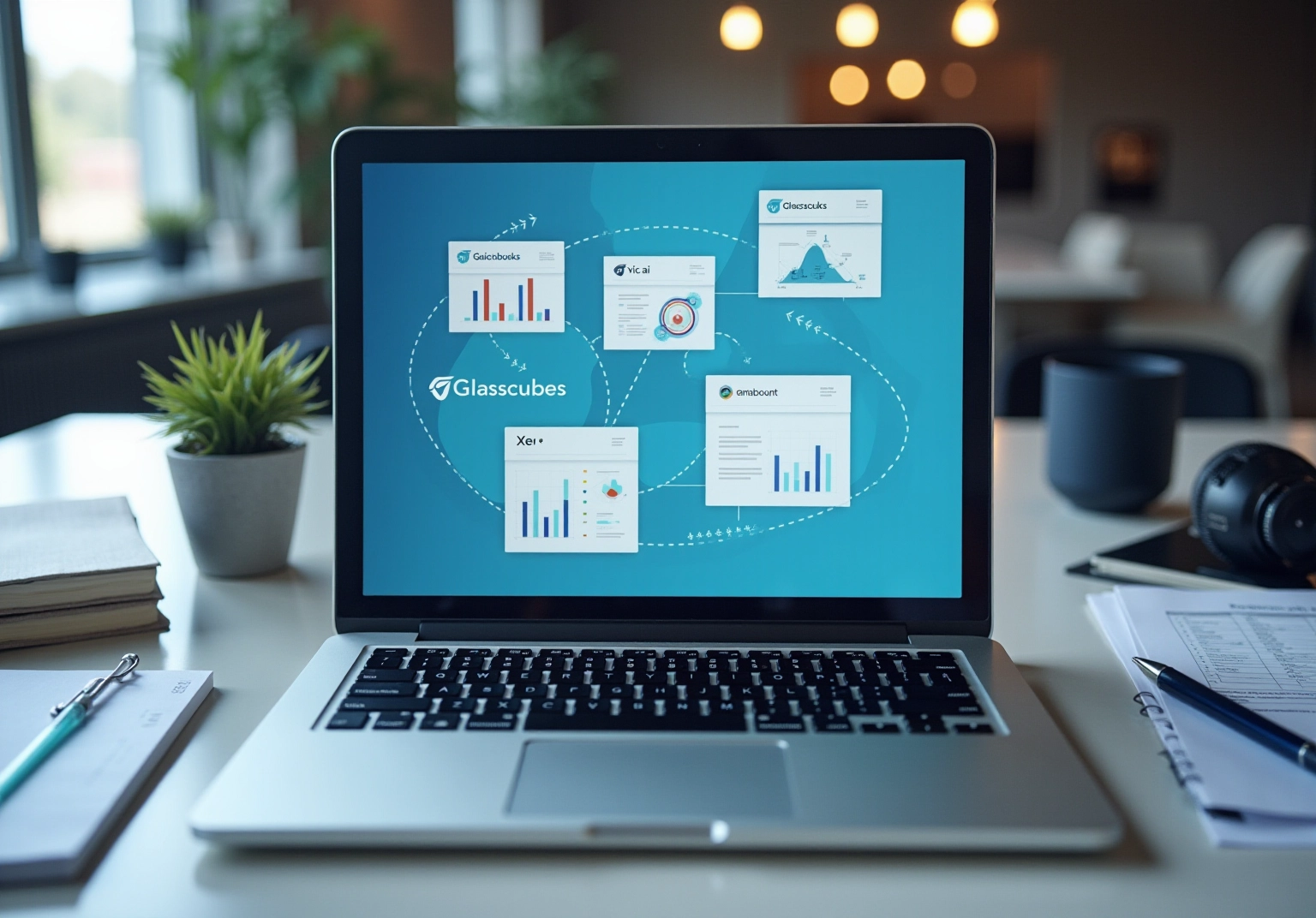Overview
The best AI for accounting significantly enhances efficiency by automating repetitive tasks, improving data accuracy, and providing predictive insights. Leading the market are tools such as:
- Glasscubes
- QuickBooks
- Xero
These platforms exemplify how technology can revolutionise the accounting landscape. For instance, the automation capabilities of these tools not only streamline workflows but also free accountants to concentrate on strategic activities, thereby improving client communication. By focusing on user-friendly interfaces, these solutions empower professionals to navigate complex data seamlessly. As you consider your options, reflect on how implementing such tools can transform your accounting practises and elevate your business to new heights.
Key Highlights:
- AI is revolutionising accounting by automating tasks, enhancing data accuracy, and providing predictive insights.
- Key benefits of AI in accounting include reduced manual workload and the ability for accountants to focus on strategic activities.
- When evaluating AI accounting tools, consider automation capabilities, user interface, integration, compliance, customer support, scalability, and pricing.
- Glasscubes is noted for its robust automation features, improving client communication and response times.
- QuickBooks offers comprehensive accounting features with AI-driven insights for forecasting and reporting.
- Xero is favoured for its advanced AI features and user-friendly design, particularly for small to medium-sized businesses.
- Vic.ai specialises in automating accounts payable processes, while Sage Intacct provides strong financial management capabilities for larger companies.
- Selecting the right AI tool involves assessing organisational needs, budgeting, trialling software, evaluating vendor support, gathering client feedback, and ensuring scalability.
Introduction
Artificial Intelligence is fundamentally transforming the financial landscape, equipping accountants with unparalleled tools that automate tedious tasks and significantly enhance data accuracy. As firms increasingly adopt AI solutions, it becomes essential for accounting professionals to understand how to select the most effective tools to boost operational efficiency and elevate client satisfaction.
However, with a plethora of options available, how can accounting professionals adeptly navigate the complexities of AI tools to identify the perfect fit for their unique needs?
Understanding AI’s Role in Accounting Tools
Artificial Intelligence (AI) stands as a transformative force within the financial sector, recognised as the best AI for accounting, empowering tools that automate repetitive tasks, enhance data accuracy, and deliver predictive insights. With technologies such as machine learning and natural language processing, financial software can swiftly analyse vast data sets, identify patterns, and generate actionable insights. This evolution not only simplifies traditional financial processes but also allows accountants to focus on higher-value activities, including strategic planning and advisory services for clients. As organisations increasingly adopt AI-powered solutions, understanding the roles of these technologies is vital for selecting the best AI for accounting to enhance operational efficiency and customer engagement.

Key Comparison Criteria for AI Accounting Tools
When evaluating AI accounting tools, several key criteria must be considered to ensure optimal selection:
- Automation Capabilities: Glasscubes excels with extensive automation features, including automated reminders and task management. These capabilities significantly reduce manual workload by streamlining routine tasks such as data entry and client communication. Firms leveraging automation have reported a remarkable 50% decrease in response times, coupled with substantial time savings.
- User Interface: The platform is designed to be as intuitive and convenient as email, allowing accountants to navigate the software efficiently, without the need for extensive training.
- Integration: Glasscubes provides an Open API, enabling smooth integration with existing financial systems. This facilitates seamless operations and enhances overall workflow efficiency.
- Compliance and Security: With full GDPR compliance and robust security features—including fully encrypted data and ISO27001 certification—Glasscubes ensures the protection of sensitive financial information.
- Customer Support: A dedicated customer success manager is available to assist during onboarding and throughout the user experience, guaranteeing reliable support whenever it is needed.
- Scalability: The application is designed to grow alongside the firm, offering scalable solutions such as unlimited storage and user licences. This accommodates increasing data volumes and user numbers without compromising performance.
- Pricing: Glasscubes presents various pricing plans, including a monthly account fee of £120 for the Essential plan, £180 for the Professional plan, and £360 for the Advantage plan, with user licence fees ranging from £18 to £38, depending on the chosen plan.
By thoughtfully evaluating these criteria, financial professionals can select the best AI for accounting tools that enhance efficiency and align with their strategic objectives.

Comparative Analysis of Leading AI Accounting Tools
In this comparative analysis, we delve into several leading AI accounting tools that are transforming the landscape of financial management:
-
Glasscubes: Renowned for its robust customer engagement features, Glasscubes excels in automating information gathering and enhancing communication between accountants and clients. Users have reported significantly faster responses from customers and improved transparency, as all necessary information is centralised in one secure workspace. The user-friendly interface accommodates unlimited client requests, establishing it as a premier choice for UK accountants. Clients value the ability to log in and view outstanding queries, streamlining the audit process and fostering greater overall engagement.
-
QuickBooks: A widely recognised application, QuickBooks offers comprehensive accounting features complemented by AI-driven insights for financial forecasting and reporting. Its strong integration capabilities with various applications render it versatile for diverse business needs.
-
Xero: Xero distinguishes itself with advanced AI features that facilitate smarter reconciliations and real-time reporting. It is particularly favoured by small to medium-sized enterprises due to its ease of use and robust customer support.
-
Vic.ai: This application focuses on automating accounts payable processes, leveraging AI to enhance accuracy and reduce processing times. Its machine learning capabilities enable it to learn from past transactions, continually improving its performance.
-
Sage Intacct: Sage Intacct is recognised for its strong financial management capabilities, providing advanced reporting and analytics powered by AI. It is especially suitable for larger companies requiring rigorous financial oversight.
By understanding these tools, accounting professionals can make informed decisions that enhance operational efficiency and client satisfaction with the best AI for accounting.

Choosing the Right AI Tool for Your Accounting Firm
Selecting the best AI for accounting tools is crucial for enhancing efficiency and client engagement. To navigate this process effectively, follow these essential steps:
-
Assess Your Needs: Clearly identify the specific challenges your organisation faces, such as time management, client communication, or data accuracy. Understanding these pain points will guide your selection process.
-
Budget Considerations: Establish a budget for software solutions, acknowledging that investing in a strong resource can lead to significant long-term savings. Small businesses usually allocate about $1,105 each year per CPA for training, whereas larger organisations invest roughly $658, emphasising the significance of budgeting for efficient resources.
-
Trial and Feedback: Take advantage of trial periods offered by many software providers. This enables your group to assess usability and functionality, ensuring the resource meets your company’s specific requirements. User testimonials, including Sophie Montgomery from TaxAssist Accountants noting an impressive 288 hours saved in a single tax season, demonstrate the practical advantages of experimenting with resources like Glasscubes. Furthermore, the automated reminder feature of Glasscubes can greatly improve client communication by enabling organisations to send personalised reminders, ensuring that crucial deadlines are met without the inconvenience of lengthy email exchanges.
-
Long-term Support and Updates: Evaluate the vendor’s commitment to ongoing support and software updates. A dependable ally will guarantee that the resource stays pertinent as technology advances, which is essential in a swiftly transforming sector. Notably, 56% of accounting professionals believe that a firm’s value drops if it does not utilise the best AI for accounting, underscoring the necessity of selecting a vendor committed to continuous improvement.
-
Client Feedback: If relevant, collect insights from clients about their experiences with the resources, especially concerning communication and information sharing. This feedback can offer valuable insights into the device’s effectiveness. Before utilising Glasscubes, numerous companies encountered difficulties with information requests, frequently leading to lost data and redundant efforts because of prolonged email communications. The transition to Glasscubes can alleviate these issues, enhancing engagement and information management efficiency. Furthermore, 19% of accounting specialists think their colleagues express enthusiasm about AI, mirroring the sector’s attitude towards these resources.
-
Future Scalability: Ensure that the selected resource can expand with your company’s growth. It should support a growing number of users and data volumes without compromising performance. Companies investing in the best AI for accounting can unlock up to seven weeks of capacity per employee each year, highlighting the significance of choosing scalable tools that can expand alongside the organisation.
By following these steps, accounting firms can make informed decisions that enhance efficiency and client engagement.

Conclusion
The integration of AI into accounting tools signifies a pivotal shift in the operations of financial professionals, enhancing efficiency and allowing for a greater focus on strategic initiatives. The most effective AI for accounting not only automates mundane tasks but also offers valuable insights that facilitate improved decision-making and client engagement. As firms increasingly acknowledge the potential of these technologies, the selection of the appropriate AI solution becomes essential for sustaining a competitive edge.
Key considerations when choosing AI accounting tools encompass:
- Automation capabilities
- User interface design
- Compliance
- Security features
- Customer support
Tools such as Glasscubes, QuickBooks, and Xero distinguish themselves with their unique offerings, ranging from robust automation to advanced reporting functionalities. By meticulously evaluating these criteria, accounting professionals can make informed decisions that align with their operational needs and strategic objectives.
Ultimately, the right AI accounting tools can significantly enhance productivity, streamline processes, and nurture improved client relationships. As the landscape of financial management continues to evolve, embracing these innovations is not merely advantageous but essential for firms striving to thrive in a dynamic environment. Investing in the best AI for accounting today lays the groundwork for a more efficient and responsive future within the financial sector.
